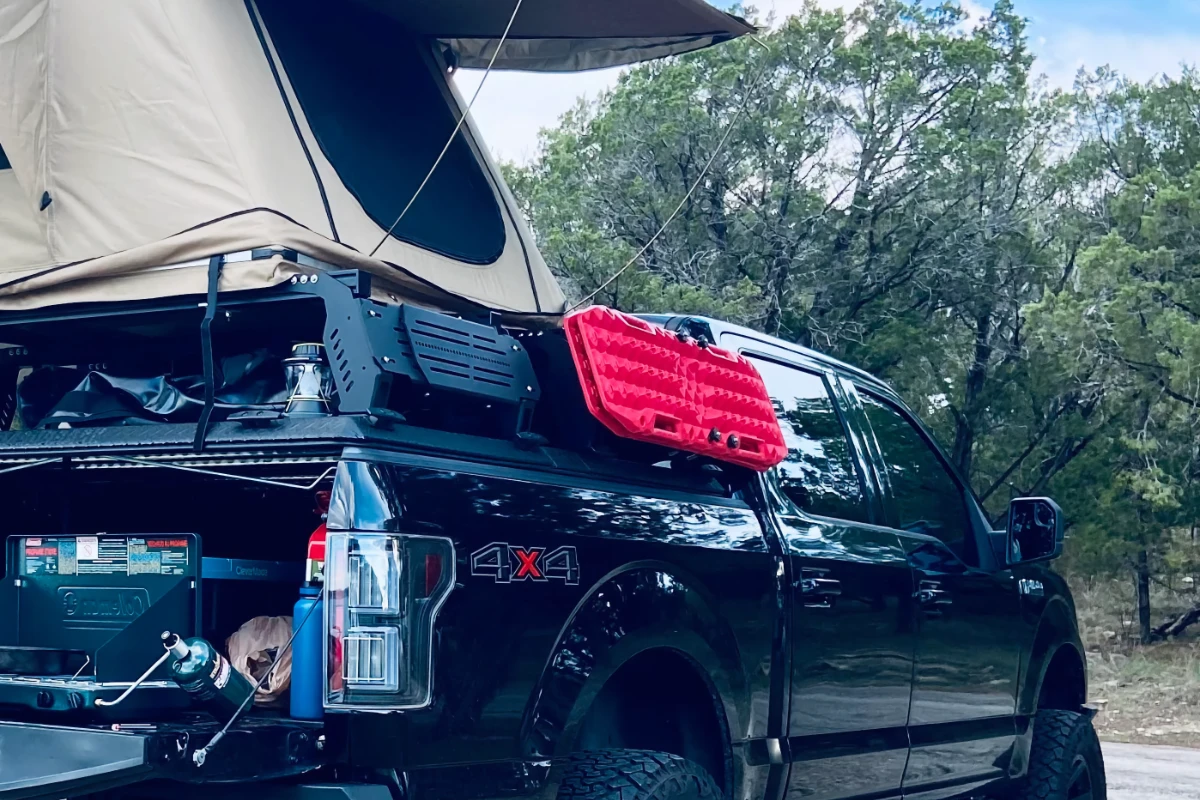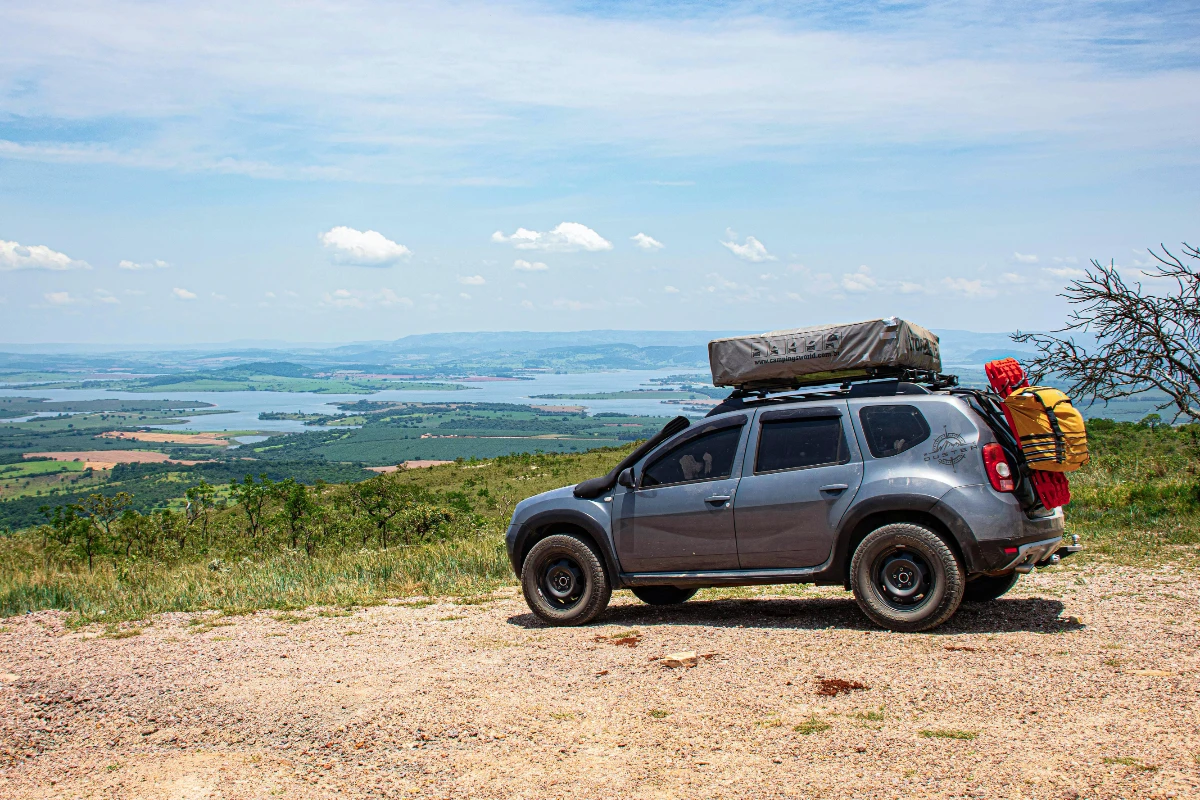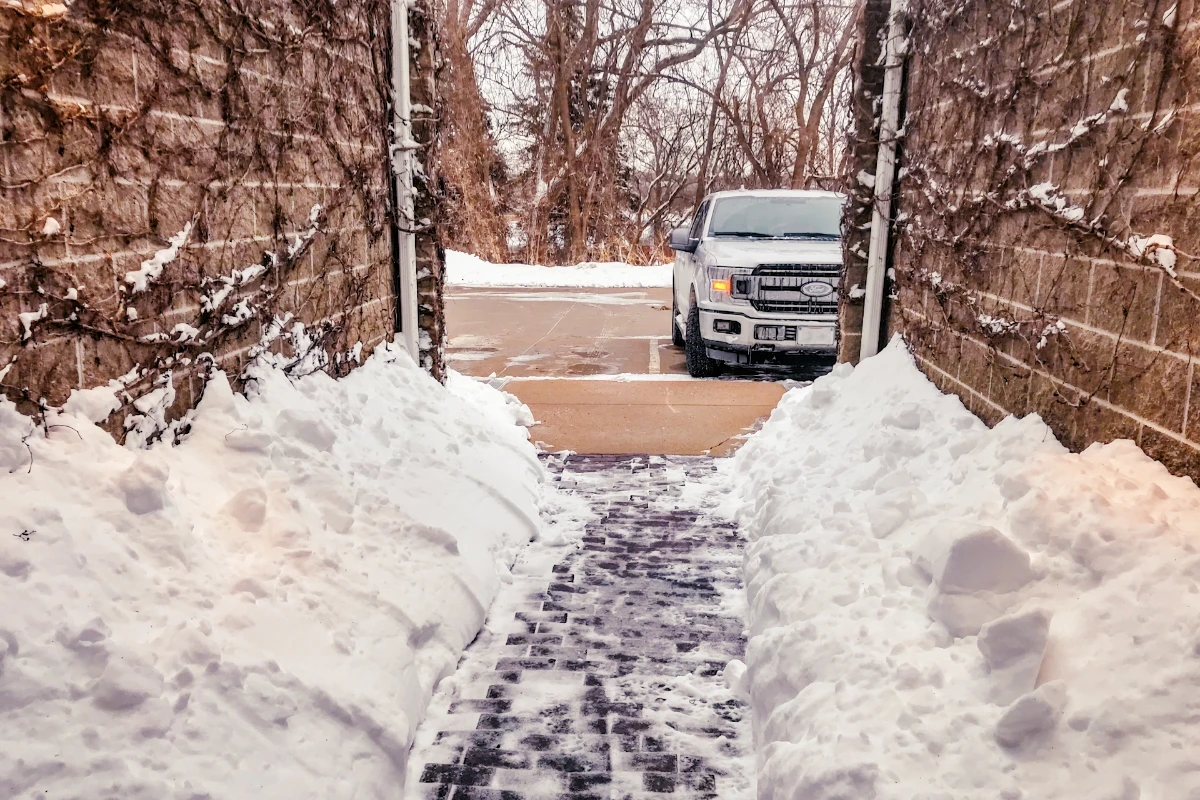What is Overlanding?

Overlanding Defined
Overlanding is a self-reliant adventure travel approach that uses a 4×4 vehicle or motorcycle to explore remote destinations where the journey itself becomes the primary goal rather than the destination. Unlike typical road trips or car camping, overlanding emphasizes long-distance, self-sufficient travel over challenging terrain, often lasting weeks or months as travelers immerse themselves in diverse landscapes and cultures.
As someone who transitioned from traditional backpacking to overlanding over the past three years, I’ve experienced firsthand how this travel style combines the freedom of road travel with the immersive experience of backcountry exploration. From weekend getaways to navigating technical trails in Utah’s backcountry to camping atop mountain passes in Colorado, overlanding has transformed how I experience the outdoors.
Overlanding vs. Off-Roading vs. Car Camping: Understanding the Differences
Many newcomers confuse overlanding with similar outdoor activities. Here’s how they differ:
| Activity | Primary Focus | Duration | Self-Sufficiency |
|---|---|---|---|
| Overlanding | Journey through remote areas, cultural experiences | Days to months | High (carries all essentials) |
| Off-Roading | Technical driving challenges and vehicle performance | Hours to days | Low to moderate |
| Car Camping | Base camp activities in established campgrounds | Weekends | Low (relies on facilities) |
The Rise of Modern Overlanding: Current Trends in 2025
Overlanding has evolved significantly from its roots in African safari expeditions. Today’s trends reflect both technological advances and shifting cultural priorities:
1. Sustainable Overlanding
The movement toward eco-conscious travel has gained tremendous momentum. Many overlanders now use:
- Solar power systems for electricity
- Water filtration instead of plastic bottles
- Electric vehicle conversions (the Rivian R1T and Ford F-150 Lightning have become popular platforms)
- Biodegradable cleaning products
2. Minimalist Builds
While Instagram might showcase extravagant rigs with every accessory imaginable, more experienced overlanders are embracing minimalism:
- Lightweight, modular systems
- Multi-purpose gear
- Simpler vehicle modifications focusing on reliability
3. Digital Nomad Integration
The remote work revolution has merged with overlanding, creating a new breed of travelers who:
- Work from their vehicles with mobile internet solutions
- Incorporate Starlink satellite connectivity for remote work
- Design rigs with dedicated workspaces
4. Community-Based Exploration
Apps like iOverlander, Gaia GPS, and overlanding forums have fostered community-based knowledge sharing. These platforms enable:
- Real-time campsite reviews
- Trail condition updates
- Meetups and group expeditions
Essential Vehicle Considerations for Overlanding
Your vehicle is the foundation of your overlanding experience. Based on my three years in the community and conversations with dozens of experienced overlanders, here are the key factors to consider:
Proven Overlanding Vehicle Platforms
While nearly any vehicle can be adapted for overlanding, certain models have proven especially capable:
Mid-Size SUVs/Trucks:
- Toyota 4Runner/Tacoma (exceptional reliability record)
- Jeep Wrangler (superior off-road capability)
- Ford Bronco (strong aftermarket support since reintroduction)
Full-Size Options:
- Ford F-150 (excellent payload capacity and comfort)
- Toyota Land Cruiser (legendary worldwide reliability)
- RAM 1500 (comfortable for long-distance travel)
Budget-Friendly Choices:
- Subaru Outback (capable with modest modifications)
- Nissan Xterra (affordable capability)
- Older Toyota 4Runners (proven reliability even with high mileage)
Critical Vehicle Modifications
From my experience, these modifications offer the best value for aspiring overlanders:
- Suspension Upgrades – A 2-3″ lift with quality shocks (like Old Man Emu or Icon) improves clearance without sacrificing reliability
- All-Terrain Tires – Falken Wildpeak AT3W or BFGoodrich KO2s balance off-road traction with on-road comfort
- Recovery Points – Quality front and rear recovery points for extraction when stuck
- Underbody Protection – Skid plates for vital components (transmission, transfer case, fuel tank)
- Storage Solutions – Drawer systems, roof racks, or bed racks to organize gear

Essential Overlanding Gear: 2025 Recommendations
Based on extensive personal testing and community feedback, here are specific gear recommendations that balance quality, durability, and value. Many of these items serve double-duty as emergency preparedness supplies during power outages or natural disasters at home.
Shelter Systems
Roof-Top Tents:
- iKamper Skycamp 3.0 ($3,899): Spacious, quick setup, durable
- Roofnest Condor XL ($3,295): Excellent weatherproofing
- Budget Option: Smittybilt Overlander ($1,395)
Ground Tents:
- Kodiak Canvas Flex-Bow ($599): Extremely durable, comfortable in varied weather
- REI Base Camp 4 ($449): Excellent quality-to-price ratio
Water & Food Systems
Water Storage:
- Front Runner Water Tank (42L, $385): Durable, space-efficient design
- Rotopax Water Containers (2 gallon, $155): Modular mounting options
Cooking Equipment:
- Partner Steel Stove ($310): Bombproof reliability, simple design
- Skottle Kit by TemboTusk ($275): Versatile cooking surface
- Camp Chef Everest 2X ($165): Powerful output, compact storage
See Also: How to Choose a Portable Refrigerator.
Power Systems
Battery Systems:
- Goal Zero Yeti 1500X ($1,799): Powers most needs, recharges via solar
- Jackery Explorer 1000 ($999): More affordable alternative
- DIY Dual Battery System (~$600-800): Best value for experienced builders
Solar Options:
- Renogy 200W Flexible Solar Panel Kit ($499): Mounts on vehicle roof
- Goal Zero Boulder 100 ($299): Portable, deployable at camp
Planning Your First Overlanding Trip
After helping several friends plan their initial overlanding experiences, I’ve developed this proven framework for successful first trips:
1. Start Local and Simple
Your first overlanding trip shouldn’t be a month-long expedition through remote backcountry. Instead:
- Choose a destination within 3-4 hours of home
- Plan for 2-3 nights maximum
- Select routes with cell service for most areas
- Have established campgrounds as backup options
2. Essential Route Planning Resources
These tools have revolutionized overlanding navigation:
- onX Offroad ($29.99/year): Shows land ownership, trail difficulty ratings
- Gaia GPS Premium ($39.99/year): Comprehensive topographic maps, offline navigation
- iOverlander (Free): User-generated campsites and points of interest
3. Sample Beginner-Friendly Routes (U.S. Based)
- Mojave Road, California: Historic 140-mile trail with moderate challenges
- Midwest: The Best Car Camping Locations in Nebraska
- Alpine Loop, Colorado: Spectacular mountain scenery with developed campsites
- Catskill Mountains, New York: Mix of forest roads and established campgrounds
- Oregon Backcountry Discovery Route: Well-documented with regular supply points
Overlanding with Environmental Responsibility
The growing popularity of overlanding brings increased responsibility to preserve the areas we travel. Based on Leave No Trace principles and overlanding-specific considerations:
Practical Tips for Minimal Impact
- Stay on established routes – Never create new trails or bypasses
- Pack out all waste – Carry trash bags and dispose properly
- Use existing fire rings or bring a portable fire pit
- Carry a portable toilet system for areas without facilities
- Research local regulations before your trip
- Choose biodegradable soaps and cleaning products
- Camp on durable surfaces like established sites, rock, or dry grass
Overlanding Community Resources
Connect with these communities to accelerate your learning and find travel companions:
- Expedition Portal Forums: Extensive knowledge base
- r/overlanding on Reddit: Active community with regular trip reports
- Overland Bound: Membership organization with regional meetups
- Facebook Regional Groups: Search “Overlanding [Your Region]” for local communities
My Personal Overlanding Journey: Lessons Learned

When I first transitioned from backpacking to overlanding, I made every common mistake imaginable:
- Overpacking: My first trips involved bringing far too much gear, most of which remained unused
- Overbuilding: I spent thousands on modifications before understanding what I actually needed
- Overplanning: I created rigid itineraries that left no room for exploration
Today, after three years and thousands of miles across North America, my approach has evolved dramatically:
- Simpler Vehicle Setup: My F-150 has modest modifications (2″ lift, all-terrain tires, bed rack)
- Modular Systems: Most gear serves multiple purposes and adapts to different trip styles
- Flexible Itineraries: I identify key destinations but remain adaptable to conditions and discoveries
Most Valuable Lessons
- Reliability Over Capability: A slightly less capable vehicle that never breaks down is superior to a heavily modified rig that leaves you stranded
- Skills Over Gear: Learning proper recovery techniques, basic mechanics, and navigation matters more than having premium equipment
- Community Connections: Some of my best experiences came from connections made through overlanding communities
Is Overlanding Right for You?
Overlanding offers an unparalleled blend of adventure, self-sufficiency, and immersion in nature. While it requires investment in vehicle, gear, and skills, few other travel styles offer the same freedom and connection to landscapes and cultures.
Whether you’re looking to escape weekend crowds at traditional campgrounds or dreaming of months-long international expeditions, the overlanding community welcomes travelers at every experience level and budget range.
The journey truly is the destination—and overlanding provides both the means and mindset to embrace that journey fully.